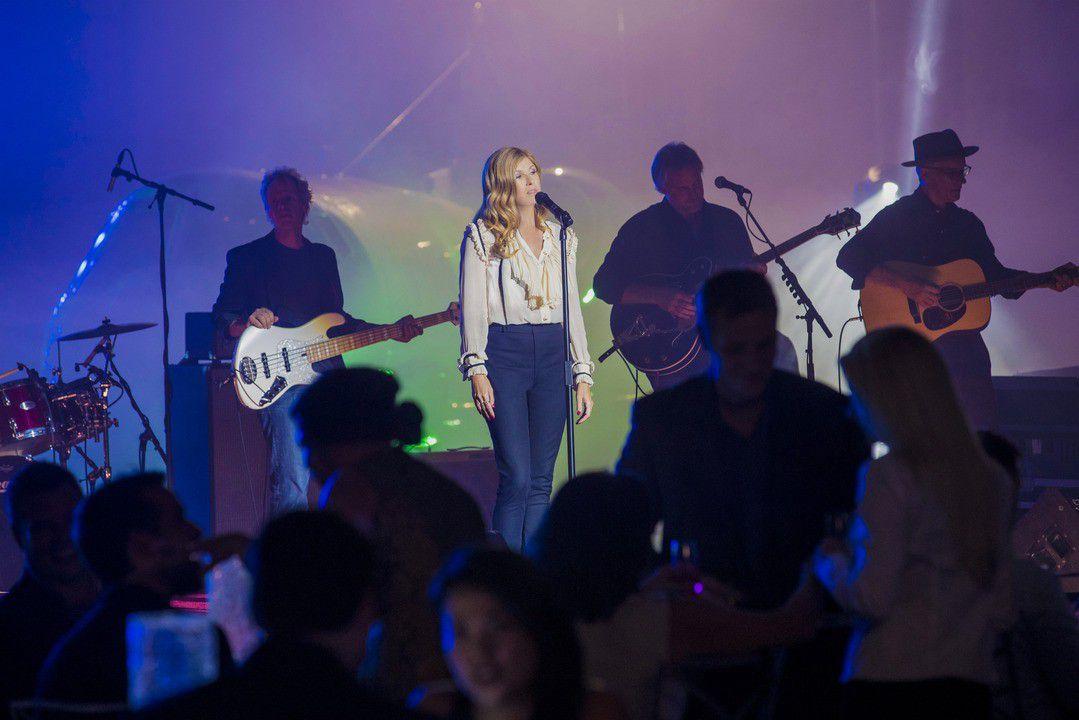
Last May 12, Deadline reported that ABC had canceled Nashville, the country-music relationship drama starring Connie Britton, Hayden Panettiere, and several square-jawed, brown-haired, handsome men. ABC billed the feel-good fourth-season finale, which aired two weeks later, as a series finale, and for almost 42 minutes, it felt like one. Three pairs of exes got back together. A splintered family reformed. A troubled diva moved past her mistakes. In scene after scene, the script called for closure, and the action resolved a line of loose ends.
That changed in the last 33 seconds, when the harmonious episode ended on a dissonant note. In the finale’s final scene, Avery, one of the least square-jawed of the brown-haired, handsome men, waited on a tarmac for Juliette Barnes (Panettiere’s troubled diva, with whom he’d just reconciled). As he stood over a stroller, gazing down at their daughter, an airport official approached and told him that there had been a distress signal, and that air traffic control had lost contact with Juliette’s plane. It was a classic cliffhanger, seemingly inserted just to torture Nashville fans forever.
Of course, as many observers suspected (and subsequent events confirmed), the makers of Nashville never intended for the series to end with the fate of one of its protagonists literally up in the air. The series spent less than three weeks in limbo before announcing its new home on CMT, where its fifth season will start with a two-hour opener this Thursday. Nashville’s false ending was just the latest example of what a so-called series finale can look like in the era of Too Much TV, when the final episode on one network sometimes doubles as an audition for a pickup and premiere on another. Last year set a record with an estimated 455 scripted series on broadcast, cable, and streaming networks, and if the 8 percent growth in that total from each of the past two years repeats itself in 2017, the count will climb close to 500. That means more opportunities for new productions, but it also means more openings for flagging shows that can catch the eye of outlets that are new to scripted TV.

At ABC, Nashville had always been on the bubble, but the network kept renewing it even as its average ratings sank slightly in each season. Although the show did unusually well among DVR viewers, a downturn in its overnight ratings toward the end of Season 4 sent the seasonal average below 5 (and below 1 in the 18–49 demo) for the first time. Either that or the exit of ABC president and Nashville booster Paul Lee, who was fired in February, helped seal the series’s fate.
“It all happened very quickly,” says Chris Selak, the executive vice president of TV for Nashville producer Lionsgate. The day before the cancellation report, Deadline had run another story about a string of three Nashville virtual reality digital specials that were set to arrive alongside each of the season’s remaining episodes, which seemed to point toward a renewal. When the hammer fell, the show’s producers were no less blindsided than the fans. “All indications were that it was going to be on the fall schedule,” Selak says. “It hit Deadline within 10 minutes of them putting a phone call into us that it wasn’t.”
With two weeks left in the series’ life at ABC, the producers had to decide what to do (and convince ABC to let them do it) very quickly. “We had a cliffhanger ending to the season, and we started talking about, ‘OK, well, we want to find home for this,’” Selak says. “We actually think that there are other networks that will pick up the show. There are a lot of fans. And so internally at Lionsgate, we wanted to air the cliffhanger.”
That decision would deprive the series’s hardcore fans, known as “Nashies,” of the short-term satisfaction they craved, with no guarantee that the gamble would pay off later. “We knew it was a risk because we didn’t have another network lined up, but we just felt, the Nashies will appreciate seeing the ending that was written, and we would probably figure out a way to get it to them if, unfortunately, the show didn’t get picked up by another network,” Selak says. Lionsgate didn’t discuss what that way would be, but thanks to today’s array of delivery systems and the numerous networks starving for scripted content, the risk wasn’t as great as it once would have been. In the worst case, the producers could have delivered an online-only episode or found an outlet for a one-off televised special. As long as Nashville’s coffin was missing its final nail, Selak says, the producers “wanted the Nashies wanting more,” and they knew that the cliffhanger, more so than the upbeat reunion scene that had also been filmed, would “[keep] the conversation going.”
Even with the creative team’s collective mind made up, the plan was subject to ABC’s approval. “When we first went to them, of course, they wanted an ending that wrapped it up, just because it was the end of the series for them,” Selak says. “But they felt bad having to cancel the show. They were actually personal fans of it. It was obviously a business decision, so I think in the end, they wanted what was best for the show and so they allowed us to air the cliffhanger.”
Immediately after ABC declined to renew Nashville, the Nashies banded together to demonstrate that the show’s audience did have a hunger for more. With encouragement from the cast, #BringBackNashville repeatedly trended on Twitter, with some fans directing their tweets to networks such as Netflix and Hulu (the latter of which already carried new Nashville episodes the day after they aired on ABC). An online petition addressed to nine networks or streaming services garnered nearly 175,000 signatures.
A post by the petition’s author, published shortly after the CMT news was announced, declared, “We did it we brought back Nashville!!!!!” New Nashville co-showrunner Marshall Herskovitz, a TV veteran who was already crafting fifth-season story lines when ABC canceled the series, isn’t as certain that the fan support had a direct effect. As a cocreator of Once and Again and an executive producer of My So-Called Life — whose lone season ended on a cliffhanger and inspired the first online fan campaign — he had already seen concerted efforts from fans fail to bring back two ABC shows.
“In both cases, there were very vocal campaigns on the part of fans to save the show and the network didn’t care at all, paid no attention,” Herskovitz says. “ABC understood that there were fans that really loved [Nashville] and wanted the show to go on. That wasn’t enough for them to keep it on.” While the campaign didn’t sway ABC, though, Selak says it played “an important role” in the conversations with CMT. “That’s one of the questions: Are the fans going to come? Especially for CMT, who’s launching into scripted and they’re using this show for viewers to find their cable network. They definitely need the core fans to show up and to search it out.”
When a show gets canceled, it decomposes quickly: Cast members commit to new projects, writers scatter, sets are torn down. Newton’s law of inertia also applies to TV, and the longer a production remains at rest, the more force it takes to get it going again. The immediacy of the fan response, which Selak describes as “very 2016,” helped the negotiations reach a resolution before the clock ticked for too long. “There could have been a call-in [campaign], a mail-in [campaign], [which] in years past other shows did do,” Selak says. “That took time, whereas this, we were able to set the show up at another network within weeks.”

Although Selak says Lionsgate talked to “a handful” of networks, CMT always made the most sense. “We’d been in discussions with them over the year prior, just new business conversation as we do with all networks,” Selak says. “And they were starting to voice that they had a desire to get into scripted programming, and they always used Nashville as the prototype. … When the show was canceled, it was pretty immediate that Lionsgate and CMT started talking realistically about moving Nashville to the network.”
Nashville will be the 33-year-old network’s second scripted show, following Still the King, the Billy Ray Cyrus comedy about a failed Elvis impersonator that debuted in 2016. Still the King’s ratings — 0.12, on average, in the 18–49 demo — were far worse than those of the lowest-rated ABC series, but it got a second season, as CMT (which is available in roughly three-quarters of U.S. homes with cable) tries to beef up its scripted offerings to supplement its reality lineup, syndicated shows and movies, and music videos. Nashville couldn’t be more on-brand for a country music network, and CMT’s ratings bar is likely low enough for the ABC cast-off to clear. “The big broadcast networks insist on a larger audience than cable networks do,” Herskovitz says. “There will be cable networks catching up, and in some cases they beat the networks, but I think CMT was probably willing to live with the audience that ABC had, and ABC wasn’t willing to live with that audience, or at least wished they could do better with some other kind of show.”

So Nashville is about to be back — a few months later than it would have been had ABC bitten, but otherwise largely unchanged from a production perspective, with the fifth season slated for 22 episodes, almost the whole cast intact, and, according to Herskovitz, “absolutely no difference” in its budget. Some costs will continue to be defrayed by incentives packages from the state and city, which view Nashville as a tourism aid, as well as the licensing revenue from the series’s original songs and the proceeds from its concerts and soundtracks. The series will also still stream on Hulu soon after it airs on CMT.
CMT’s Nashville won’t be identical to the ABC version. Although creator Callie Khouri has helped with the transition, the showrunners and most of the writers are new arrivals, ready to foreground what they see as Nashville’s best self. “My feeling was that Nashville seemed like two different shows blanketed together,” Herskovitz says. “It seemed like a relationship drama, very similar to the types of things [coshowrunner Ed Zwick] and I had done before. … And at the same time, it was a soap opera where … people would constantly break up and sleep with other people and get back together and there was just a lot of to-ing and fro-ing. And I was quickly made to understand that the fan base of the show had gotten somewhat frustrated in the fourth season that somehow, the soap opera part of it had kind of taken over.” Herskovitz plans to let the story breathe by deviating from the ABC structure, in which every episode served every ongoing story line, yielding less depth and shorter scenes.
The difference in tone is apparent in the premiere, which presents a happier portrait of the show’s often-feuding central couple, played by Britton and Charles Esten (one of the most square-jawed of the brown-haired, handsome men). Herskovitz, who says he has “a long tradition of intentional ignorance” on the subject of audience demographics, isn’t going out of his way to tailor the show to CMT spectators. He’s trying to widen its musical scope to embrace other eras and genres, and he doesn’t drag out the cliffhanger’s suspense. “Ed and I lived our career in television in plots about whether you’re going to get a babysitter or not,” Herskovitz says. “The chance to actually deal with a plane crash was pretty exciting to the two of us.”
The story of Nashville’s salvation isn’t unprecedented. The show is following in the footsteps of other series with low ratings but loyal core audiences that have been resurrected via nontraditional routes, including Community and The Mindy Project. It’s not even the first show Selak has worked on that changed networks to extend its run; Southland got four TNT seasons after NBC ended it after one. Still, Selak believes that it’s getting easier for this sort of second act to occur, which gave the producers the confidence to air a cliffhanger for an ostensibly discontinued show. “There are more buyers and more networks emerging into scripted,” she says. “When a show isn’t working or we know it’s going to go down and we know it still has a lot of life left into it, we are always considering, ‘OK, is there somewhere else that can use this show to brand their network?’”
The recent explosion in scripted TV is good news for creators, good news for fans of niche shows, and potentially good news for networks that are always one hit away from critical reappraisal and, perhaps, higher ratings. “It’s very important to remember that we are living in this revolutionary moment in television where one series can completely transmogrify a network,” Herskovitz says. “What was AMC before Mad Men? What was WGN two years ago? What was USA? It doesn’t matter where you are anymore. It’s an extraordinary moment, really, where the audience will find you wherever you are if you have something that they’re interested in watching. … That’s a great gift, and it would not have been true 10 years ago, but it sure is true now.”

